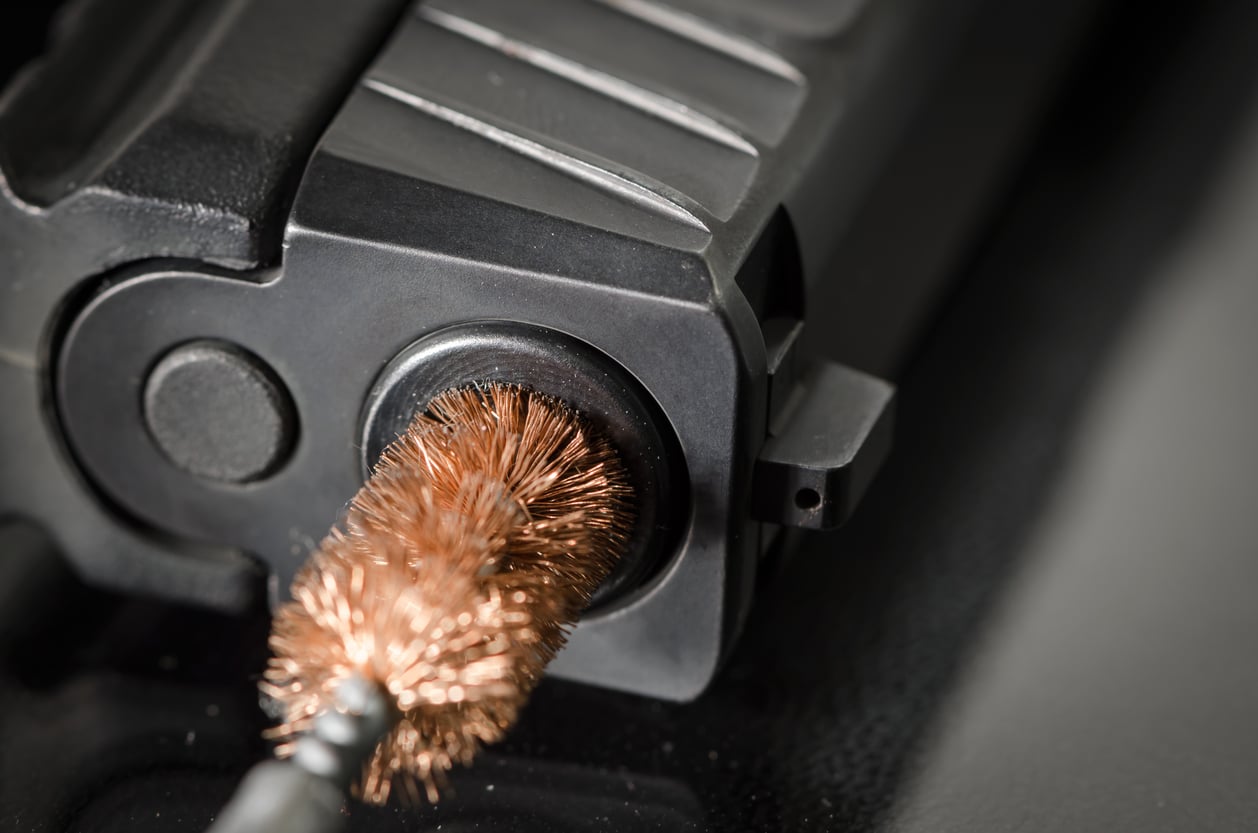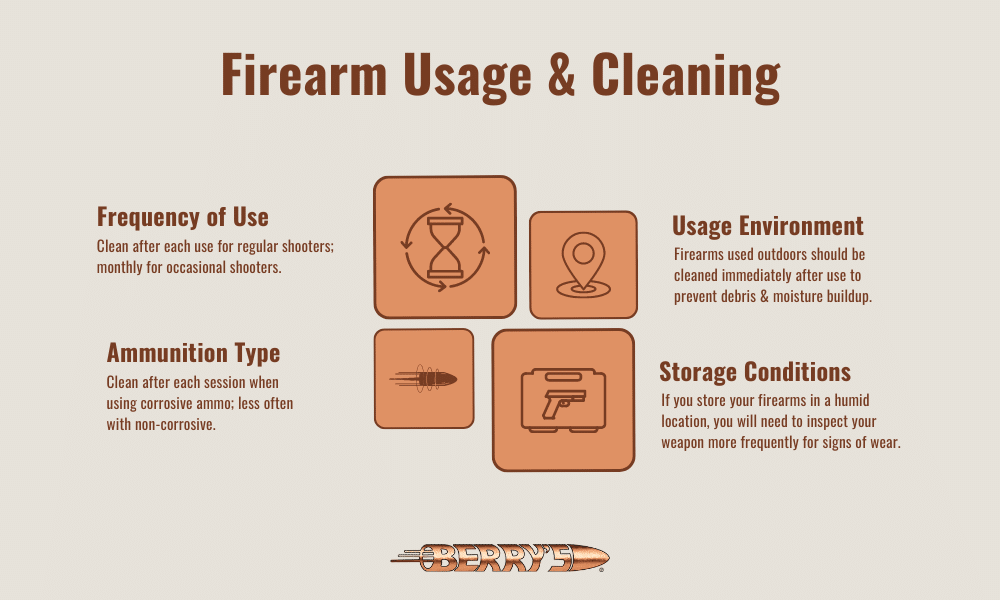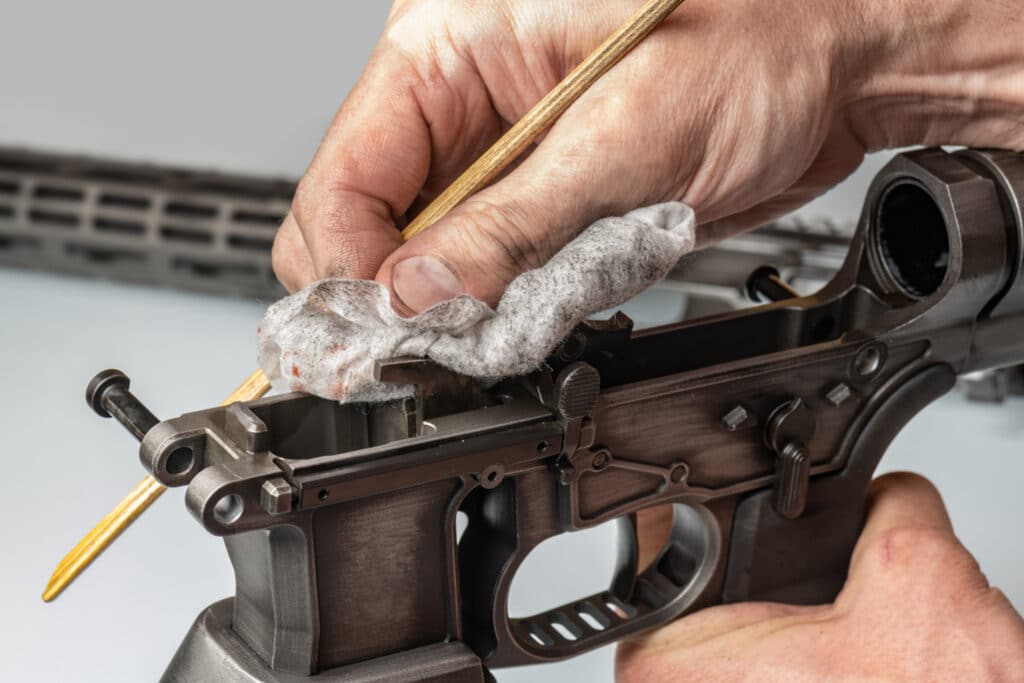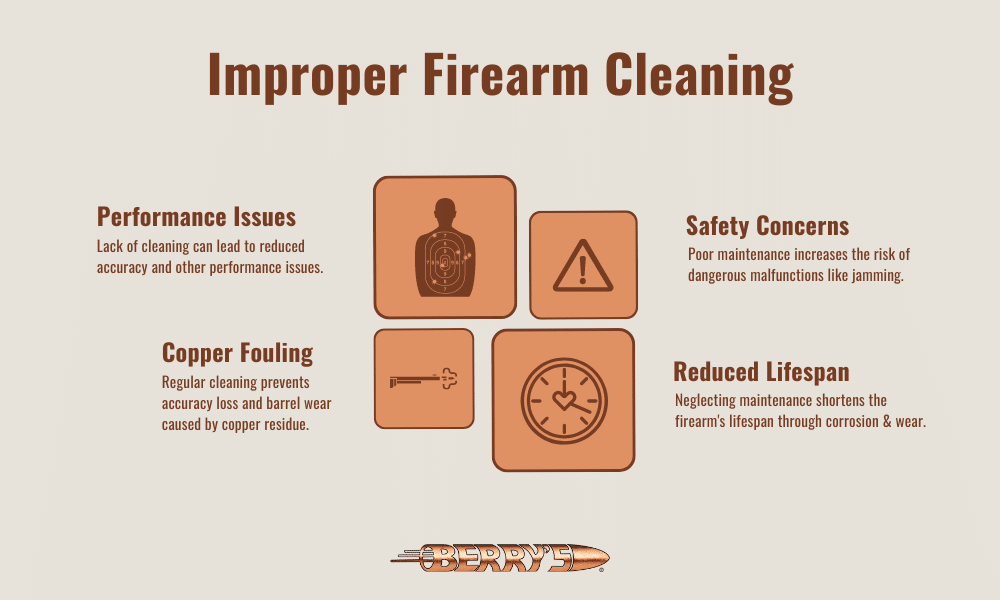Your cart is currently empty!

Firearm Cleaning Guide
Table of Contents:
- The Impacts of Firearm Use on Cleaning Frequency
- Understanding the Firearm Cleaning Process
- The Dangers of Improper Firearm Cleaning
- Simplifying the Firearm Cleaning Experience with Berry’s
If you’re a firearm enthusiast, you’ll know there’s more to shooting than consistently hitting your target. Good care and cleaning are essential to owning a firearm, and this leads many first-time gun owners to ask themselves: “How often should I clean my firearm?” In this guide, you’ll learn about the details of firearm cleaning, recognizing signs of a dirty gun, and effective gun cleaning methods.
The Short Answer: How often you should clean your firearm varies significantly based on several factors such as usage frequency, type of ammunition, and storage conditions. However, a firearm should be cleaned once every month if it’s not used regularly (once or twice a month). For firearms that are used frequently (multiple times per week), cleaning after every use is advised to maintain peak performance.
The Impacts of Firearm Use on Cleaning Frequency

Frequency of Use
Your shooting habits directly influence the cleaning schedule for your firearms. For instance, competitive shooters may use their firearms multiple times a week, leading to quicker buildup of residue from rounds fired, dirty barrels, and more. The residue can impact shooting accuracy and gradually degrade the firearm’s performance. So, if you’re a competitive shooter who hits the range for sessions multiple times a week, it’s advisable to clean your firearm after each use.
If you use your firearm less frequently, say for the occasional hunting trip or session at the shooting range, the time between cleanings can be extended. However, this doesn’t mean you can ignore regular maintenance altogether. Even with less usage, cumulative residue and potential exposure to elements mean that your firearm will still need in-depth cleaning at least once a month.
Ammunition Type
The type of ammunition you use can significantly impact how often you should clean your firearm. Specifically, using corrosive ammo (ammo that contains primers made with potassium chlorate or other chemicals) necessitates a more diligent cleaning routine.
If you’re using corrosive ammunition, it’s best to clean your firearm after each shooting session to prevent this damage. Non-corrosive ammunition is less demanding in regards to immediate cleaning, providing a bit more flexibility. However, regular cleaning after every few uses is still recommended to ensure optimal firearm performance.
How You Use Your Firearm
Where you use your firearm also impacts cleaning frequency. Firearms used in outdoor settings like during a hunting trip or at an outdoor range are exposed to elements such as dust, moisture, and other potentially damaging factors.
In these cases, completing a basic field strip and wiping down your firearm after usage would be prudent as this could prevent any small particles from lingering and causing long-term damage. Especially after a range trip to a sandy or dust-filled environment, initiating the cleaning process soon after usage will prevent the buildup of debris and moisture.
How You Store Your Firearm
Finally, proper storage also plays a big role in proper maintenance. If you store your firearm in a humid or damp environment, such as a basement or a poorly ventilated area, you are at greater risk of moisture accumulating on the metal surfaces, which can lead to rust and corrosion over time. In such cases, even if the firearm hasn’t been used frequently, you should inspect and dry it regularly – at least every few weeks – to prevent any wet patches from causing moisture-related damage.
Conversely, if you store your firearm in a controlled, dry environment, such as a gun safe with a dehumidifier, the risk of moisture damage is significantly reduced. This allows for a longer interval between cleanings, especially if the firearm isn’t in frequent use. However, periodic checks and maintenance should still be performed to ensure that dust, oil, and other contaminants don’t accumulate and affect the firearm’s condition.
Understanding the Firearm Cleaning Process
Taking care of your firearm isn’t just about knowing when to clean it, it’s about knowing how to as well. Let’s take a more in-depth look into the proper cleaning process.

Regular Cleaning: The Step-By-Step Process
Regular cleaning should be a basic routine every firearm owner adheres to. Here’s a step-by-step guide.
Step 1: Field Strip the Firearm
Begin by disassembling your firearm into its main components. The extent of disassembly will depend on your firearm type but typically includes the barrel, slide, guide rod, and magazine. If in doubt, refer to your firearm’s manual for correct instructions.
Step 2: Clean the Barrel
The barrel is particularly prone to residue buildup and thus requires special attention when cleaning. First, use a cleaning rod or bore snake to run a cloth through the barrel. This removes loose debris and prepares the barrel for a thorough clean.
Next, attach a bore brush to the cleaning rod. Apply a cleaning solution to aid in breaking down tough residues. Pass the brush through the barrel several times until no more residue remains. Finish with another dry cloth to absorb any leftover solution and dislodged debris.
Step 3: Clean Other Components
Use a clean cloth and cleaning solution to wipe down the other components of your firearm. Use a toothbrush to scrub away stubborn buildup if necessary.
Step 4: Reassemble and Lubricate
When your pieces are clean and dry, reassemble your firearm. As an extra step, lubricate movable parts to ensure smooth operation.
Deep Cleaning: Going Beyond Basic Maintenance
A few times a year, your firearm may need more thorough cleaning. This goes beyond regular cleaning and involves breaking down your firearm’s smaller pieces, like the firing pin, which can accumulate grime over long periods.
Deep cleaning follows similar steps to regular cleaning, but with a more detailed focus. Use the cleaning solution and a brush on each small piece and paying close attention to crevices. Rinse and dry each piece thoroughly before reassembling. Remember, understanding how to properly clean your firearm takes time and practice.
The Dangers of Improper Firearm Cleaning
Maintaining your firearm isn’t just about preserving the lifespan of your gun, it’s also about ensuring it functions safely and effectively. Ignoring deep cleaning or neglecting cleaning altogether can have serious consequences. Let’s take a look at some of the potential ramifications.

Performance Issues
Regular maintenance is critical for the firearm’s optimal performance. Over time, debris and buildup from rounds fired can accumulate within the barrel and other components leading to failure of the firearm to function properly. For instance, a dirty barrel could affect your shooting accuracy by causing rounds to deviate from their intended path. Lack of regular cleaning could also lead to increased wear and tear and eventually lead to maintenance issues such as jamming and failure to discharge rounds.
Safety Concerns
Another vital aspect to consider is safety. A firearm is a powerful tool and should be treated with the utmost respect. Just like any other tool or device, if it is not well maintained and carefully cared for, it can predispose the user to risks and hazards. Improper maintenance and cleaning can potentially lead to catastrophic malfunctions, such as barrel obstructions or misfires.
Copper Fouling
One common issue that arises from inadequate firearm cleaning is copper fouling, where copper residue from bullet jackets accumulates inside the barrel. This buildup can gradually degrade shooting accuracy by interfering with the bullet’s trajectory and causing increased wear on the barrel. Frequent cleaning, especially after each shooting session, helps to prevent copper fouling from becoming a significant problem. By using a copper solvent to remove these deposits promptly, you can maintain the firearm’s accuracy and extend its overall lifespan, ensuring it continues to function reliably.
Lifespan of Your Firearm
Lastly, ignoring regular cleaning and maintenance can shorten the lifespan of your firearm. Dirt and residue buildup can cause excessive wear, corrode the metal parts, and accelerate the firearm’s aging process.
Simplifying the Firearm Cleaning Experience with Berry’s
While understanding how and when to clean your firearm is crucial, having the right tools for the job is equally as important. That’s where Berry’s Bullets steps in. Why trust us? Over the years, we’ve grown beyond our 80 types of superior plated bullets to earn a reputation for providing high-quality firearm maintenance tools as well.
One of our standout maintenance products is our innovative gun vise which provides an adjustable platform for easy and effective firearm cleaning. One of the things that sets our vise apart is our 360° Ball & Case technology, which allows you to easily swivel and maneuver your firearm during the cleaning process.
So what are you waiting for? Enhance your firearm cleaning experience today with the Berry’s Gun Vise!
